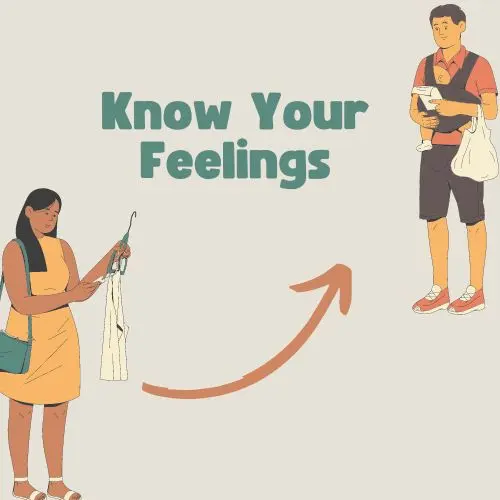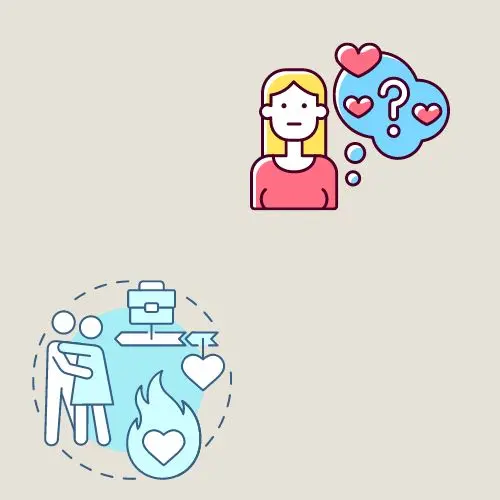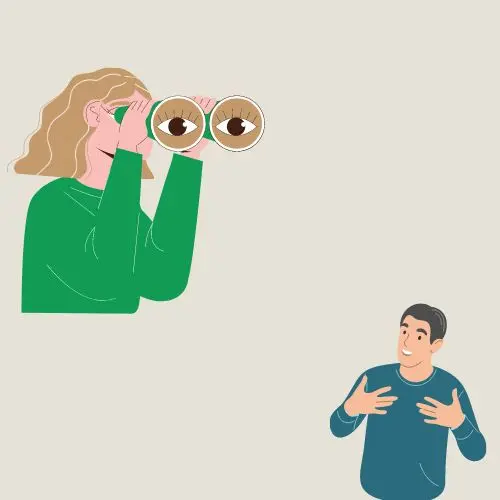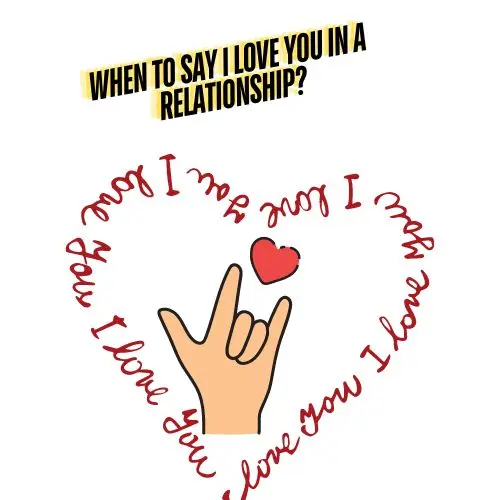When Is the Right Time to Say “I Love You”?
Knowing when the time is right to lay your heart bare is a personal journey for every couple. What feels soon for some may be too early for others. The most important things are listening to your heart, and gauging if your partner is in a good place to receive such a profound sentiment in return.
Look for hints they care for you deeply too. But avoid saying the words solely out of fear, insecurity or just to get a response. Your partner deserves pure, unadulterated truth above anything else
Know Your Feelings

Before saying “I love you,” take some time to truly understand your own emotions. Ask yourself questions like:
- Do I have strong feelings of caring, commitment, and connection toward my partner?
- What do I emotionally and intellectually associate with the word “love”? Am I prepared for what saying it implies?
- Have my feelings grown steadily over time or was there a sudden rush that makes me question if I’m truly in love?
Carefully examining your feelings will help ensure you are genuinely in love and not confuse infatuation for love or feeling pressured into saying it prematurely. If you have doubts or uncertainty about your emotions, it’s best to wait until you feel 100% sure.
Consider the State of the Relationship

Think about how your relationship has progressed so far. Ask yourself:
- How long have we been seeing each other? Is our level of trust, intimacy, and commitment in line with the stages of dating at this point?
- Have there been any recent arguments, misunderstandings, or doubts that could cloud how the “I love you” is received?
- Do we know each other deeply on many levels – likes and dislikes, hopes and dreams, past relationships and family?
The deeper your connection and understanding of each other, the better equipped you’ll both be to handle saying and hearing “I love you” in a healthy way. Rushing this step too fast can strain a new relationship.
Gauge Your Partner’s Comfort Level
Consider your partner’s likely reaction as well. Ask yourself honestly:
- How do they typically handle vulnerability and strong emotions in relationships?
- Have there been any signs they may not be comfortable with intense professions yet?
- If they reacted poorly, would I be devastated or understand it’s because they need more time?
If your partner seems emotionally unavailable or distant due to past hurts, has trust issues or moves slowly in relationships, it’s usually best to wait until they clearly show a desire for a deeper level of intimacy through their words and actions. Forcing the issue could increase stress on the relationship.
Timing Tips Based On Relationship Stages

While every couple’s timeline is unique, here are some general guidelines on when saying “I love you” tends to work best based on relationship stages:
Early Stage (1-3 Months)
If you’ve been dating for a few months but haven’t established committed trust and compatibility yet, it may be too soon. Infatuation can feel like love at this stage. Wait until feelings have endured ups and downs.
Developing Stage (3-6 Months)
Once you’ve been intimate on multiple levels for several months, exclusive for a while, and feel an overwhelmingly strong bond, it’s generally safe to express your love if the moment feels completely right.
Committed Stage (6 Months – 1 Year)
By half a year, you likely know enough about one another as a couple to say it if you have a steady, supportive relationship and communicate frequently about your connection. Both partners will hopefully be ready.
Long-Term Stage (1+ Years)
In established relationships of a year or longer, there’s usually a high level of comfort, commitment, and trust where saying “I love you” for the first time can be a sweet milestone after so much time together.
Finding the Perfect Moment

Even when the timing feels right based on your relationship’s development, look for an opportune moment to naturally express your feelings. Some effective options include:
- During a caring, engaged conversation where you’re truly listening to one another
- When sharing something deeply personal or meaningful about yourself
- In a tender, romantic setting like after making love, on a date under the stars, or while cuddling at home
- When complimenting their character or qualities you find lovable
Avoid saying it during or immediately after an argument or disagreement. The message is more likely to land smoothly when emotions are positive and you’re both focused on each other.
Saying It for the First Time

When that perfect moment arises, be open and vulnerable while expressing yourself. Some tips:
- Make gentle, loving eye contact and smile warmly
- Say something like “I care so much about you. I’m falling in love with you.”
- Briefly explain what you find so lovable and what makes your bond special
- Give them space to react, however, they feel without pressure
- Reassure your commitment no matter what they say in return
Keep the first exchange simple, emotional yet not over-the-top intense. Your goal is a caring dialogue, not a dramatic declaration. Let sincerity shine through naturally.
Receiving “I Love You” For the First Time
On the receiving end, here are pointers for how to handle those cherished three words:
Express Appreciation for Vulnerability
Even if you’re not ready to say it back yet, acknowledge their bravery in opening up. Say something nice like “Thank you for sharing your heart with me. That means a lot.”
Be Truthful About Your Own Emotions
Gently explain where you’re at in an honest yet sensitive way. Phrases like “I care for you deeply but am not there yet” or “My feelings are still developing” show respect for both of you.
Reassure the Relationship
Let them know saying it back won’t destroy what you have or change your commitment level. For example, “I enjoy our time together and want to keep building on this.”
Request Patience If Needed
It’s fair to say “I need some time to process this before responding. Will you give me space on this without pressure?” Compromise shows on both sides.
Consider Saying It Back Conditionally
If you’re very close emotionally but cautious due to past hurts, try “I’m almost ready to say that too but want to be completely sure first.” This maintains intimacy.
The person baring their soul deserves a caring, empathetic response whether you can say the words yet or not. With openness, understanding and patience, this milestone can make your bond even stronger.
Saying “I Love You” And Handling The Aftermath

No matter the scenario or timing, expressing deep feelings of love through words is a huge step. How well both partners handle the aftermath strongly impacts the relationship.
Respect Each Other’s Pace
Allow your thresholds of intimacy to develop synchronically without pushing the envelope on what you or your partner can handle emotionally.
Talk Things Out With Empathy
Check-in after by asking how the exchange felt for each other and share any stray thoughts or concerns you have in a calm, trusting dialogue.
Express Ongoing Care & Commitment
Through affection, thoughtfulness, and quality time together, consistently show the meaning behind “I love you” goes beyond mere words through your caring actions daily.
Deal With Disappointment Healthily
If the response wasn’t ideal initially, let yourself grieve but don’t lash out, sulk or become resentful – commit to openly discussing your feelings when you’re both centered again.
Consider Love Languages
Your ways of conveying and receiving love may differ. Compromise by speaking each other’s love languages so you both feel truly loved and secure in this bonding stage.
Enjoy Positive Changes Together
Notice and appreciate any shifts in closeness, understanding, or new intimacies between you through this emotional benchmark by expressing gratitude for each other specifically.
With patience, honesty, and emotional maturity on both sides, saying “I love you” can become a tremendously meaningful and unifying experience that elevates the relationship to new heights regardless of any hurdles encountered initially. Focusing on sustaining intimacy versus fears of rejection serves couples well.
Conclusion
In conclusion, there is no perfect universal formula for when to say “I love you” – only guidance based on relationship development, self-awareness, gauging your partner’s comfort level, and finding the right context and timing. However, expressing love through words when you truly mean it from the heart, while respecting each other’s unique pace, can be an incredible bonding

